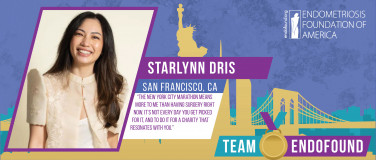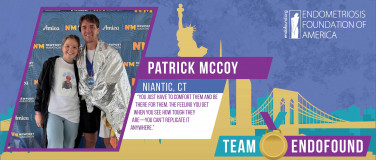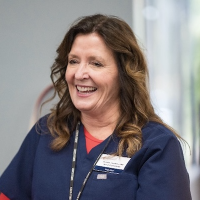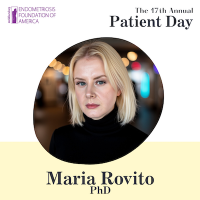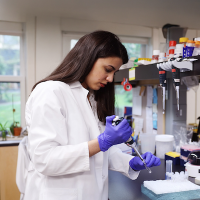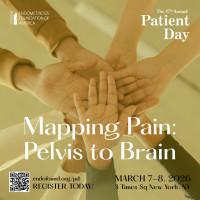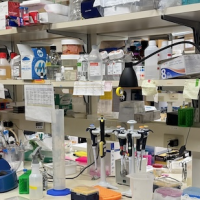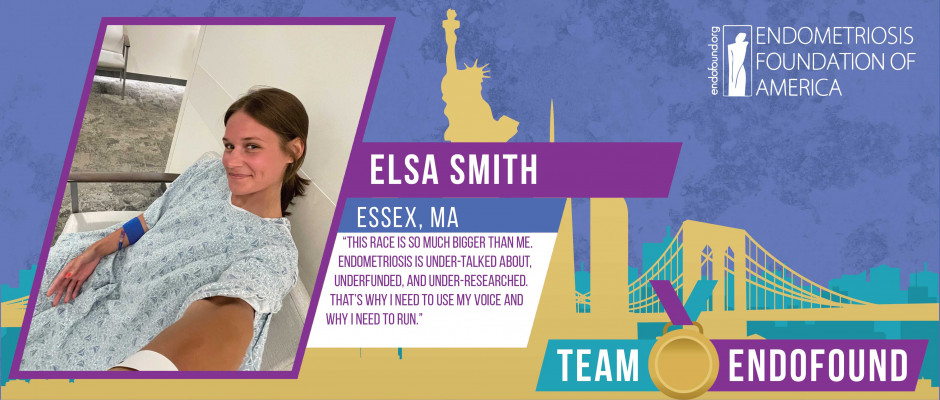
On November 2, Elsa Smith will run for EndoFound’s Team EndoStrong in the New York City Marathon. On November 6, she will have her second endometriosis excision surgery, hoping it will end the pain that’s gripped her for most of the past decade.
“When one of my options for surgery was four days later, I said, ‘Let’s do it.’ It just felt like the right time,” Elsa said. “I’m excited and nervous. I’m excited about the marathon, and I know how much this surgery can help me, but I also know that it’s a high-level surgery on an important part of my body.”
Elsa, 23, is a project manager for a commercial construction company and lives in Essex, Massachusetts. The marathon will be her first full one. Her goal is to raise $5,000, while the collective goal of the 50-member team is to raise $300,000. All money will go to EndoFound’s education, advocacy, and research programs.
“My training for the marathon has been both humbling and empowering,” Elsa said. “Some days it feels impossible because of the pain or fatigue, and I wonder what I signed myself up for. But then those same days remind me why I’m doing this—to raise money for an important cause and to remember that so many people with this disease are undiagnosed or don’t have access to proper care or specialists. That’s made the training on the hard days a lot easier.”
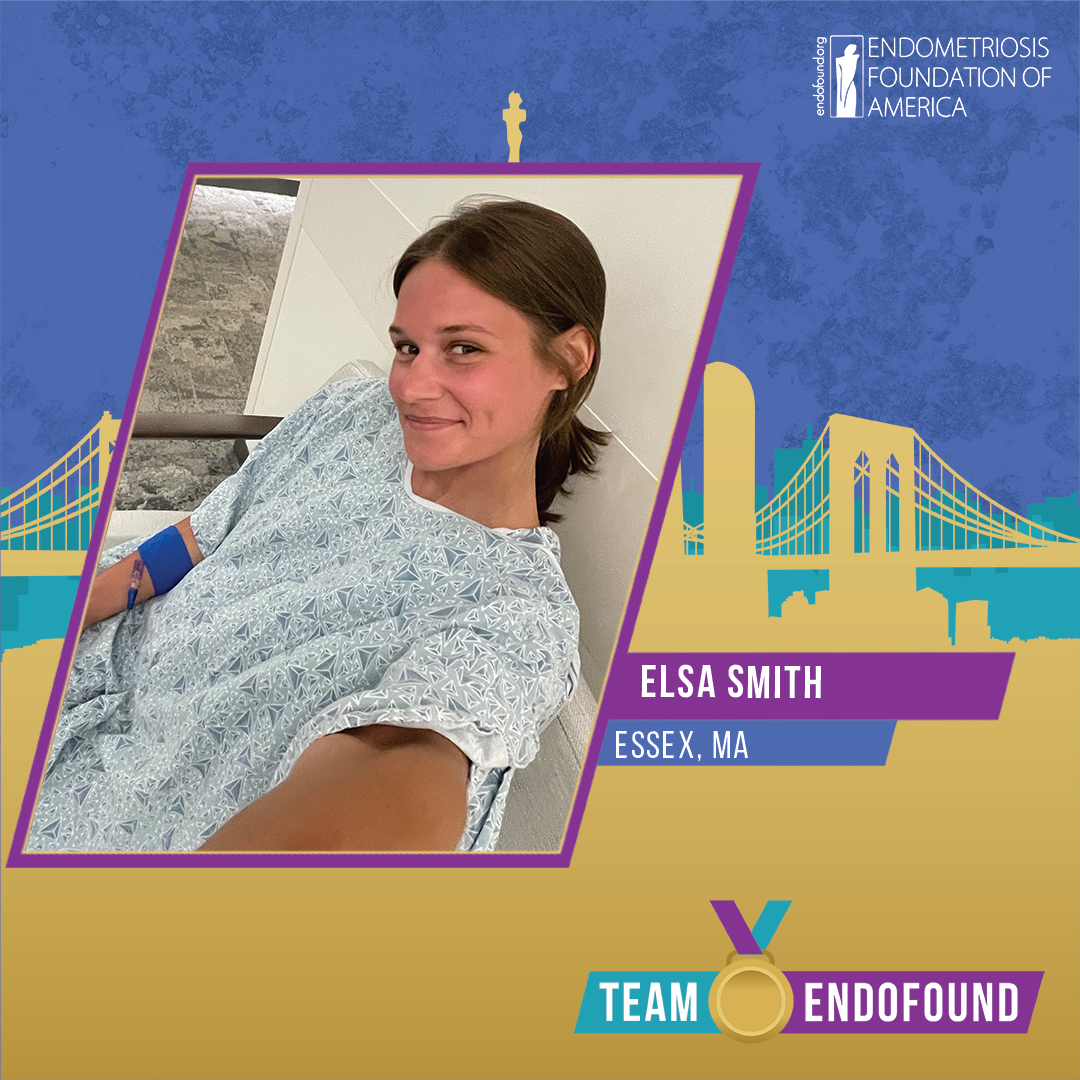
Click Here To Support Elsa Smith's Marathon Fundraiser
Elsa began feeling significant pain with her first period when she was 12. As one of four children, including an older sister and younger sister, conversations about menstrual periods were normal in her home, but Elsa wasn’t convinced that her pain was anything to worry about.
“I just thought I either had a lower pain tolerance than my siblings or that some people just have worse period symptoms, so I brushed it off,” Elsa said. “I took ibuprofen and used heating pads.”
She knew it was more serious in her freshman year of high school when the pain hospitalized her.
“They thought my appendix had ruptured,” Elsa said. “They did a CT scan and the whole nine yards and said, ‘You’re fine. We don’t know what that was.’ I later went to my pediatrician and gynecologist, and they said, ‘Nothing’s wrong with you. You’re just someone who experiences really bad periods and needs to find a way to manage the pain.’”
Elsa went on birth control, which helped, but not enough to eliminate disruptions in every aspect of her life.
“I joked in high school that our school nurse was my best friend because she was always giving me ibuprofen or a warm water bottle,” Elsa said. “I missed so much school, lacrosse games, family parties, hanging out with friends. There were so many days when I couldn’t get out of bed or off the couch.”
While Elsa was young and trusted what doctors told her, her mother, Claire Smith, knew this was more than bad periods.
“My mom said there was no way that it should be to the point where I have to be hospitalized or stay home from school or am getting sick,” Elsa said. “My periods were really heavy by this time and lasting from 11 to 17 days. That’s when we both started researching to try to figure it out.”
Their research would take them on a three-year journey of reading about numerous diseases and visiting countless gynecologists. Even when Claire thought endometriosis could be causing her daughter’s pain, doctors disagreed.
“I told myself, ‘Okay, I guess I just need to suck it up and have a higher pain tolerance,’” Elsa said. “I wondered if it was in my head or if I was doing something wrong.”
Continuing to push for answers, Claire found an endometriosis specialist in Boston, about an hour from their home. Appointments were seven months out. Elsa would finally get in during her senior year of high school—and it was worth the wait.
“The doctor asked me a bunch of questions, and when I finished explaining my symptoms, she said, ‘I’m so sorry you’ve been dismissed or told that it’s not endometriosis. I’ve been doing this long enough that, just by listening to you, I’m very comfortable saying that you have it.’ She was the first person to validate my pain,” Elsa said.
Elsa had surgery a week before the COVID-19 pandemic started in March 2020. The surgeon excised a lot of endometriosis and inserted an IUD to stop Elsa’s period. The combination worked well until her senior year in college, when the pain returned. With her surgeon retired, Elsa found another specialist who suggested the endometriosis may have grown back, and she also may have adenomyosis. That’s when Elsa booked the November 6 surgery.
Elsa’s doctor offered her pain medication to get through her training and the race, but she refused, not wanting to risk any side effects. Coming from a competitive family of athletes and a history of athletic success, she’s confident she won’t need it. In fact, during her junior year of college, Elsa ran her first half-marathon in 90 minutes without training for it. Her goal for the New York City Marathon is three hours and 50 minutes.
“My siblings have bet some money on it, so that’s driving me,” she said. “Once I heard the bets coming in at sub-four [hours], I said, ‘Fine, I’ll do 3:50.’ Just finishing is really my goal, but I’ll push myself to see what I can do.”
No matter where Elsa finishes, the awareness she’s trying to create by running and the outcome of her surgery four days later are the results that matter.
“This race is so much bigger than me,” she said. “Endometriosis is under-talked about, underfunded, and under-researched. Even now, people will say it’s just bad cramps. No, it’s not. That’s why I need to use my voice and why I need to run. Endometriosis is so common, yet so few people know about it. I had days when I felt so alone, and some days I still do. Even though I’m a small part, I hope that I’m spreading awareness. Trying to make others seen and to let them know that they’re not alone and their pain is real—that’s why I’m running.”
To support Elsa Smith in the New York City Marathon with a donation, visit https://give.endofound.org/fundraiser/6358782.



